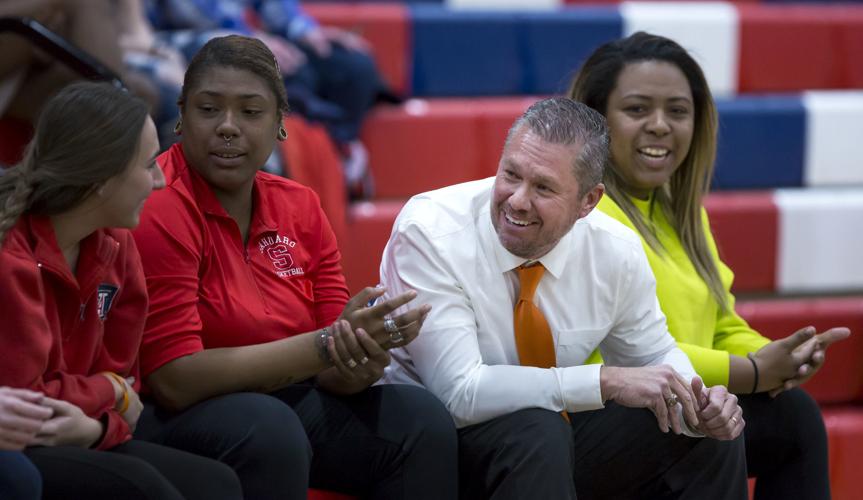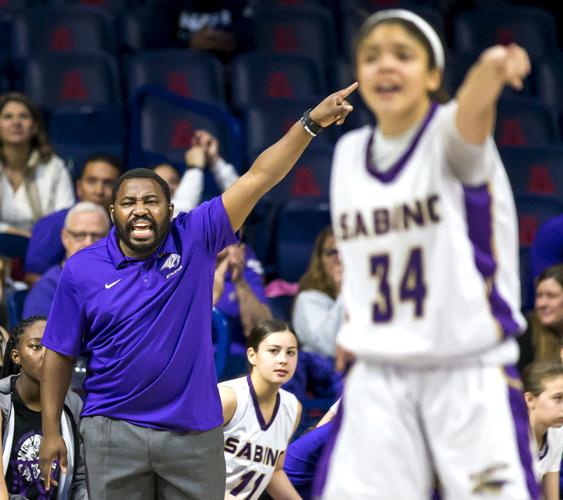Tucson is a basketball town, right?
It is a haven for NBA lottery picks, McDonald’s All-Americans, sellout crowds and Pac-12 champions. It is a place where Pima College’s men’s and women’s teams both finished No. 2 in the NJCAA in the last decade, an elite-level assembly line that has produced 12 first-team junior-college All-Americans since 2008.
Now comes Adia Barnes’ UA women’s team, ranked No. 12 nationally, drawing more than 35,000 fans in its last five games.
If you search the MaxPreps rankings, you’ll find that Sahuaro’s girls basketball team is ranked No. 1 in Arizona’s Class 4A poll and that Sabino’s girls team is ranked No. 2 in 3A. You’ll find that Friday’s monumental showdown pitting 21-1 Catalina Foothills against 22-1 Salpointe Catholic features 4A boys powerhouses ranked Nos. 1-2 by MaxPreps.
But there’s one nagging issue: a Tucson basketball team — college, JC or big school prep teams — haven’t won the Big One since 2011.
That’s when coach Ben Hurley’s Amphitheater High School boys basketball team won the state championship.
Since then it’s been an oh-fer.
The most successful basketball coach in Tucson since Arizona Gatorade Player of the Year Tim Derksen fueled Amphi’s 2011 title isn’t Arizona’s Sean Miller, Pima College’s Todd Holthaus or Brian Peabody.
It’s Sahuaro girls basketball coach Steve Botkin, who has won 81 percent of his games, 207-50, in those 8½ seasons. That surpasses Miller’s 77 percent (235-72).
And the thing about Botkin, a Sahuaro alumnus who doubles as the school’s athletic director — let’s see you get that job done in less than 60 hours a week — is that unlike Miller, Peabody and Holthaus, Botkin hasn’t been able to recruit.
“I don’t remember the last time we had a transfer student move into the district,” says Botkin, who has won 543 games as a head coach, a record for Tucson girls basketball coaches by more than 200 wins. “I’m grateful that our neighborhood kids have been so good.”
This season, junior forward Alyssa Brown leads the state in scoring, 30.8 per game, and recently the head coach at St. John’s flew across the country to evaluate Brown. Who wouldn’t be impressed? Brown is Sahuaro’s junior class president and carries a 4.0 GPA.
That re-enforces the concept that the purpose of a high school basketball coach isn’t to win state championships. It’s to help turn girls into women and boys into men.
But after you string together seasons of 23-5, 26-5, 27-5, 23-6, 26-3 and 25-4 as Botkin has done since Amphi’s 2011 state title, you start to ache to win it all. Just once.
That’s a feeling that goes around in Tucson basketball, and not just for Sean Miller. No Tucson girls basketball team — any level — has won a state championship since Canyon del Oro went 32-1 in 2009. Only two Tucson girls teams have won big-school state basketball titles this century.
It doesn’t make sense. In that same period, Tucson softball teams have won 31 state championships. Tucson’s girls soccer teams have won 16 state titles.
Each time that Botkin’s Cougars have played deep into the state tournament they’ve been bumped off by a powerful metro Phoenix team, such as Shadow Mountain, Seton Catholic, Campo Verde or Notre Dame Prep.
Based on the AIA’s power points system, which is keyed to strength of schedule, Sahuaro is ranked No. 3 entering the final week of the regular season behind — you guessed it, Seton Catholic and Shadow Mountain, two open-enrollment blessed schools that have combined to win the last three state titles and a six since 2011.
“Phoenix always has the upper hand because of its talent pool,” says Botkin, who doesn’t complain but is acutely aware of how difficult it is to play “neutral site” playoff games in Phoenix most seasons.
The good news is that Tucson is fighting back. Sahuaro and Sabino have built imposing teams, centered around Class of 2021 prospects like the Cougars’ Brown and Alyssa Frankie, and Sabino’s Kamryn Doty and Kiya Dorroh.
“The talent in Tucson has absolutely improved,” says Botkin. “The current junior class is rich in talent. It’s tough now, everywhere you go.”
Girls basketball in Tucson has been a terrific feeder system for Holthaus’ nationally-prominent Pima College program; Palo Verde’s Sydni Stallworth and Flowing Wells’ Abyee Maracigan both were first-team NJCAA All-Americans. Tucson has generated productive college players like Catalina Foothills’ Kate Engelbrecht (Arizona State), Tucson’s Christine Clark (Harvard), Flowing Wells’ Lyndsay Leikem (Indiana) and Marana’s Jamee Swan (Colorado).
But Tucson hasn’t been a source of national-level players — difference-makers — to match the county’s growing population of one million people over the last 30 years.
Salpointe Catholic’s Sybil Dosty, who led the Lancers to the 2003 state title game, signed with mega-power Tennessee and completed her college days at Arizona State.
Amphi’s Catherria Turner played at both Oregon and Oklahoma State, but it doesn’t come anywhere close to matching the Division I prospects that flow from, say, Tucson’s prep softball programs.
It’s almost baffling.
Since Arizona’s women’s basketball team began playing a Pac-10 schedule in 1987, the Wildcats have only signed two freshmen directly from Tucson high schools: Catalina Foothills’ Julie Brase and Palo Verde’s Jessica Arnold.
That matches the slim UA men’s total of the same period, Cholla’s Sean Elliott and Sunnyside’s Deron Johnson.
Somehow, Tucson has evolved as a basketball town without a bounty of championships or next-level star prospects.
From 1980-99, Tucson girls basketball teams won 10 state championships. It triggered Hall of Fame careers for coaches like Marana’s Mike Dyer, Sahuaro’s Jim Scott, and CDO’s Dan Huff. Now Steve Botkin carries the torch.
It has been a lonely duty for far too long.





